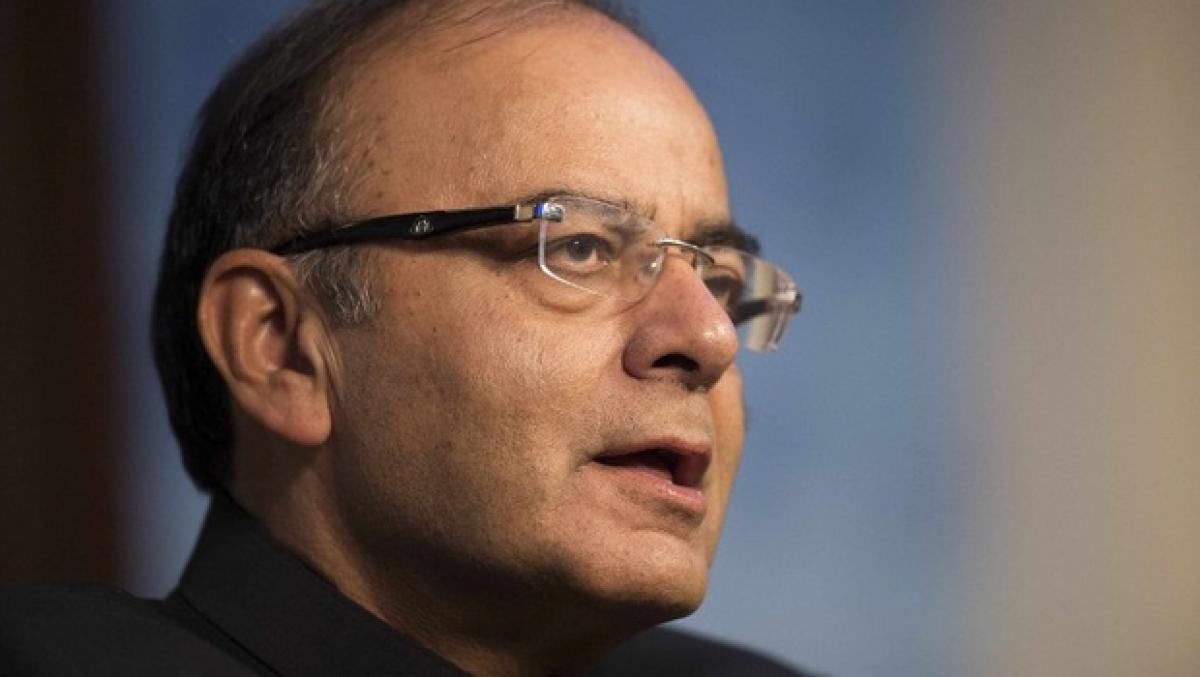Live
- Six Useful Strategies to Control Your Heart During the Pollution Season
- Phalodi Satta Bazar Predicts Close Race in Maharashtra Assembly Election 2024
- Federer Pays Heartfelt Tribute to Nadal Ahead of His Retirement: "An Epic Career"
- Odisha holds successful mega investors roadshow in Singapore
- PGTI Tour: Top stars to fight for honours in Servo Masters Golf
- SC upholds termination of LIC employee for absenting himself without intimation
- ‘Stone me or shoot me, won’t spare anyone,’ says Anil Deshmukh after discharge
- Siddaramaiah, Shivakumar turning Karnataka into Pakistan: K’taka BJP
- Zimbabwe records 70 suspected cholera cases, one death amid new outbreak
- Babri demolition day: No Assembly proceedings in Bengal on Dec 6
Just In

Investors must pay taxes on money they earn in India and the domestic economy is now strong enough to depend on any \"tax-incentivised route\" to attract foreign investments, Finance Minister Arun Jaitley said on Sunday.
New Delhi: Investors must pay taxes on money they earn in India and the domestic economy is now strong enough to depend on any "tax-incentivised route" to attract foreign investments, Finance Minister Arun Jaitley said on Sunday.
He said there was no "serious apprehension" of investors shifting base to other tax havens and he sees no depletion in FDI flows due to re-drawing of decades-old tax treaty with Mauritius—the biggest source of foreign investments into India.
The amendment would also help check round-tripping of funds and boost the domestic consumption, Jaitley added. After toiling for almost a decade to redraw the tax treaty with Mauritius, India will begin imposing capital gains tax on investments in shares through Mauritius April next onwards.
This has been made possible with amendment to the 34-year old tax treaty between the two countries. As markets reacted cautiously to India expanding its crackdown on tax treaties to make it harder for investors to use tax havens as a shelter to avoid levies, Jaitley told PTI, "Eventually, markets have to operate on inherent strength of the (Indian) economy."
Stating that the original Mauritius treaty created "a tax-incentivised route" at a time when India was looking at foreign investments to boost economy, he said the economy has become strong enough and "now those who earn must pay taxes."
The original treaty, signed almost a decade before India opened up its economy in 1991, has helped channellise more than a third of the USD 278 billion (nearly Rs 19 lakh crore) foreign direct investment India received in the past 15 years.
The imposition of taxes has been "done in a phased manner to avoid shock and I don't expect any depletion to FDI because of this. Also eventually, markets have to operate on inherent strength of economy," he said.
Minister of State for Finance Jayant Sinha said the treaty revision will bring in lot of transparency about Mauritius-based entities investing in India.
"It will help us dramatically in curbing round-tripping because there are two very important aspects to it. One is the capital gains regime... that will be applicable at the same rate as you would get if you were a domestic resident tax payer in India. So there would be no advantage for anybody coming in through the Mauritius route after 2019. "Number two, they will also be able to get a lot more transparency on Mauritius companies that will be investing in India through the Information Exchange Protocol that we have also signed," he said.
Asked if the new treaty helps plug the loophole that existed earlier, Sinha said: "There was round-tripping of money for certain that was happening. That, of course, will stop because the capital gains benefit will go away. And the information exchange will be far more thorough."
The redrawn Mauritius treaty will trigger a similar amendment in India's tax treaty with Singapore. Mauritius and Singapore accounted for USD 17 billion of the total USD 29.4 billion India received in FDI during April-December 2015.
India last week signed an amendment to its tax agreement with Mauritius to get the right to levy capital gains tax on companies routing funds into India through the island nation after March 31, 2017.
The short-term capital gains tax will be levied at half the rate prevailing during the first two-year transition period. Short-term capital gains are taxed at 15 per cent at present. The full rate will kick in from April 1, 2019. India had in August 1982 signed the treaty with Mauritius to eliminate double taxation of income and capital gains to encourage mutual trade and investment.
"At a time when economy is picking up and looking at rest of the world, you incentivise investment in certain areas because economy needs those investment at all cost...Mauritius was created as a tax-incentivised route and a very large part of FDI came through this route," Jaitley said, adding no tax on securities transaction and on dividend was created.
As the nation of just about 13 lakh people emerged as the biggest source of foreign investment in India, suspicion also grew that a chunk of the funds was not real investment but Indians routing cash through the island to avoid domestic taxes, a practice known as 'round tripping'.
"Since 1996, we made several steps in order to renegotiate. Then in 2005, you extended some of their benefits to Singapore. In last one year, Mauritius and India had
extensive discussion. At one stage, Mauritius agreed but then there was a rethink. After a lot of discussion, a very balanced decision has come out," Jaitley said.
The Minister said people whose capital grows will have to pay tax, but investments up to March 31, 2017 has been kept out of tax ambit for giving "markets comfort".

© 2024 Hyderabad Media House Limited/The Hans India. All rights reserved. Powered by hocalwire.com







